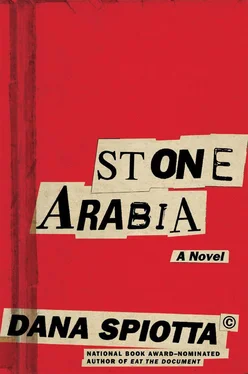I ignored my phone when it rang and then checked my voice mail. Nik wishing me a happy birthday. Later in the day, Jay would call and I would ignore that, too.
I got dressed and drove to my mother’s apartment. I promised I would stop by on my way to work so she could wish me a happy birthday. I drank more coffee from an insulated travel mug as I drove. Although she lived only one exit south on the 5, I managed to drive right into a thickening hive of slow-moving vehicles. It was mid-morning and I was clumped behind a freeway accident and riding my brakes. I came to a full stop with my exit in sight, a quarter mile of stopped cars between us. Just leave the car and walk. Wouldn’t that feel great? I yawned. I could easily smoke while I was stuck in traffic, but instead decided I would listen to a book. I bought it for myself, for my birthday. Happy birthday to me. It was a self-help book, there is no way around that fact. MemTech: Using Your Brain’s Technology at Full Capacity, which I bought because Mom couldn’t remember anything anymore. I told myself I bought it to help her cope with her lapses.
At first she just misplaced her keys. Her wallet. Her glasses. Minor things. Then repetitions of stories, then repetitions mid-conversation. She seemed more confused than embarrassed about the lapses. She acquired a static but low level of agitation (even actual hand wringing) that made her seem much more unhappy and distraught than she really was, whatever really was means. Then we got a diagnosis and I grew accustomed to the idea that things would not improve and at some point I hoped to grow accustomed to the idea that they would not even maintain.
I hadn’t paid attention to the introduction and pressed the back button to start over when the exit ramp finally opened to me.
As soon as I walked into her apartment, she started to insist that I take the boxes of used clothes she had in storage to the Salvation Army.
“And get a receipt for your taxes,” she said. I could have just said yes, sure. But I had already taken the stuff weeks ago. And we seemed stuck in replaying this same conversation. It always felt tactless to point out the repetitions, but I did because it felt too condescending not to.
“I did it already, don’t worry,” I said.
“Did you get the receipt?” She had become focused on receipts and paperwork. Our whole life growing up, I don’t remember her saying that word one single time, receipt . I doubt she ever itemized her taxes even once. But what do I know about her, really? Maybe she always kept meticulous paperwork when we were growing up and she just protected us from all of it. Maybe this was a hidden side of her always there and now leaking out. I doubted it. Now she was interested in coupons, receipts, bills, instructions, warranties, paper trails of any kind.
She kept things to show me. As she grew anxious, the receipts proved something of a comfort to her, a concrete thing she could hold that wouldn’t fade like the things she was constantly trying to recall. She nodded and walked into her bedroom. Then she came back to where I was.
She stood in the center of the living room, brows furrowed, eyes darting back to the doorway she had just passed through as though her thoughts might be right behind her, left there.
“What, Ma?”
“I don’t remember why I came in here.”
“To talk to me?”
“No!” But it was really more like “No!?”
“To find the receipts?”
“No, there was something else …” and she looked worried. How could it not be worrying? It could be anything, even something really crucial, couldn’t it?
“It doesn’t matter. It will come to you if it was important,” I said, which was not at all true. She frowned at me. She didn’t enjoy this, and it grew harder all the time. But at a certain point she couldn’t be aware of things worsening, because that required remembering how they were yesterday or last week or last month. Maybe she read it off me, off the anxiety in my face.
“Do I look older? It’s my birthday, Mama. Today. I’m forty-seven — I’m middle-aged.” I loved to tell people I was in middle age. It was so terrifying to me that I was middle-aged, it was so deeply impossible, that I wanted to say it all the time.
“Oh, happy birthday, sweetheart. You look just lovely.” She sat next to me on the couch. The blankness and anxiety left her face.
“You and Nicky got to pick your cakes. Do you remember? I had this booklet of fancy-shaped birthday cakes and how to make them? The Wilton Book of Birthday Cakes. ” She just pulled that title out of some pristine cerebral crevasse.
“Yes! The Wilton Book of Birthday Cakes, I totally forgot about that thing. I used to pore over it, plotting my cake months in advance. The Rocketship cake, the Raggedy Ann cake, the Holly Hobby cake.”
“They were complex cakes, you had to bake sheet-pan cakes and then make stencils so you could cut them in the right shapes. Then you had to decorate them properly. According to the instructions.”
“Yes, that must have been so much work. They were great, we loved them.”
“You decided you were too old for funny-shaped birthday cakes, remember? You said that was for babies. But I knew you still wanted a cake, you just couldn’t admit it. So I went in your room and I found a picture on your bulletin board—”
“ Aladdin Sane ! Of course! How could I have forgotten that? You made me a beautiful Bowie birthday cake! It was amazing, with the frosting lightning bolt across his face. I forgot all about that. That was amazing!”
We both were so thrilled that she remembered something I had forgotten. She beamed at me, nodding. Then she started to laugh, and she looked like my full, young mother for a moment. She reached for my hand and squeezed it. Her hand felt cool. Her skin looked old, but it felt soft and delicate. It wasn’t smooth and fat like a child’s skin, but it was almost softer.
“I have to go to work,” I said. I could hear my voice quake and jerk. Usually I was fine when I was with my mother. Usually I didn’t start to cry until after I left her, when I was in the car, driving. But there I was, hard-swallowing and sniffing. “I’ll be late. Mama, I love you.”
“I love you,” she said, and we hugged. I didn’t let go for an extra second. Pay attention to this. Hug tight, this could be one of the last hugs. I had been making myself think this way since I’d turned forty. My mother was not that old, but she had diabetes. She was overweight. She was not healthy. And even if she didn’t die in the next few years, her mind was rapidly slipping away. Maybe one day soon the hug won’t be with my mother, but with her body and what remains of her. One day she’ll hug me and mistake me for someone else, and so these current, somewhat intact moments were fleeting. I noted that, marked it in my mind. Don’t forget what it was like to embrace her, all of her, and don’t let it be replaced with what will come, soon, a certainly diminished future, or at least a wholly different future, because, as her doctor said without exactly saying, it will only get worse.
I have always been the sort of person who is easily panicked about how quickly time passes, but in the past this was mostly related to Ada. I would remind myself not to get too distracted, because four would soon be five would soon be ten and then her childhood would be gone forever. I remember frantically looking for the dimples on the backs of her chubby hands, convinced I would be so sad the moment I noted their certain replacement by knuckles. I would kiss those dimples — and as much as I missed them, I loved the beautiful hands that emerged. But this current accounting with my mother was so much darker: she would be less and less and then she would be gone. A memory. Ada became an adult with all of her baby brightness intact, fully realized and elaborated. And I wouldn’t have to witness her unwinding and diminishing. That would be her daughter’s burden.
Читать дальше












